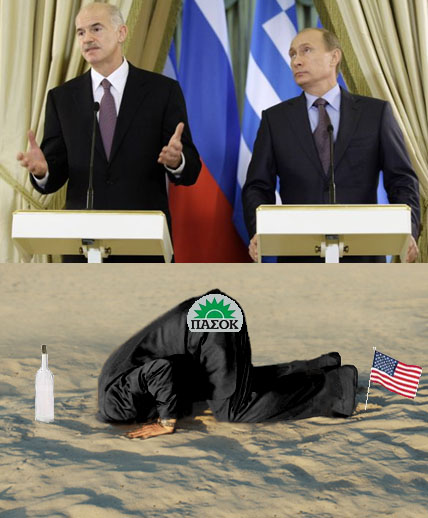
By John Helmer in Moscow
Embattled Greek Prime Minister George Papandreou (left image) met in Moscow on Tuesday with Prime Minister Vladimir Putin (right image) in hope of reviving Russian plans to deliver a new crude oil pipeline from Burgas, on the Black Sea coast of Bulgaria, to the Greek terminal of Alexandroupoli, on the Aegean; as well as confirm Gazprom’s future gas delivery plans across Greece.
Papandreou got neither; along with reassurance of a sort that reminded him of Moscow’s much warmer relations with his father, former Greek prime minister Andreas Papandreou. The senior Papandreou, who died in office in 1996, often turned to Moscow for backing when his government was under ideological, economic and military pressure from the European Union, the NATO alliance, and the US. But junior Papandreou rejected that line, breaking with many of his Pasok (socialist) party supporters in order to favour the US and Turkey — a line encouraged on him by his mother, Margaret, the second of his father’s three wives, an American.
Turkey is also the beneficiary of a new Russo-Turkish energy strategy to pipe both additional volumes of gas and at least 1.5 million barrels of crude oil per day across territory governed by Ankara. The first signals of the new strategy were issued last October by Deputy Prime Minister Igor Sechin. He supervises the Russian oil concession, as well as oil tanker, oil port, and pipeline operations; Sechin is also chairman of the board of Russia’s largest oil producer and exporter, state-owned Rosneft.
In mid-January, when Putin hosted Turkey’s Prime Minister, Recep Tayyip Erdogan, in Moscow, the Russian leader announced that he and his counterpart had “agreed to step up work on the Samsun-Ceyhan pipeline.” The Turkish company Calik Energy and the Italian company Eni are also involved; according to Putin, “we will start to study this with the Italian partners.”
Confirmation of the go-ahead for the Samsun-Ceyhan pipeline, means that Rosneft crude will be shipped by Transneft pipeline to Novorossiysk, and then by Russian-owned tankers down the Black Sea to Samsun, and into the new pipeline. At the Aegean outlet of Ceyhan, the new strategy will give Russian oil traders and tanker fleet the chance to dominate loadings and shipments. This Russian move promises to trump the earlier US strategy of installing the Turkish pipeline between Baku, Azerbaijan, and Ceyhan as a way of providing Caspian Sea crude oil exporters an alternative to having to transit Russian territory to reach the international market.
Putin’s January understanding with Erdogan has obliged Papandreou to count that there would be insufficient oil in the proposed Alexandroupoli pipeline, with 675,000 barrels per day capacity, to compete for profit against the Turkish alternative.
George Papandreou and his newly elected government are now facing more severe pressure from Brussels and Washington than a Greek government has faced since a US-backed Greek military junta replaced the Greek government in April of 1967, ahead of elections scheduled for the following month. At the time, Andreas Papandreou was arrested, imprisoned, and ultimately sent into exile abroad.
Putin refused yesterday to commit to building the Alexandroupoli pipeline. Putin did tell Papandreou that he is managing Greece’s financial troubles no worse than the US, where, according to Putin, ” we can see similar problems — massive external debt, budget deficit.” Putin also reminded the Greek prime minister that “as we all know, the global economic crisis started neither in Greece, nor in Russia, nor in Europe. It came to us from across the ocean.”
Papandreou has made public statements suggesting that the Burgas-Alexandroupoli pipeline would be a boost to his flagging economic position. Putin said financing the pipeline isn’t a problem. “There’s enough money for this type of projects. There would be absolutely no problems with funding them.” But Putin did not say that he and Sechin agree to provide Russian funds for two pipelines on either side of the Turkish straits.
Transneft, the state owned Russian pipeline company run by Nikolai Tokarev, a close associate of Putin’s and Sechin’s, claimed last month that he has not ruled out building two parallel pipelines. “We … see real prospect of association [of the two projects], ” Tokarev said in a published statement on January 19. But he has not been joined by the two state-owned oil producers, Rosneft and Gazpromneft. Instead, Rosneft has signaled it is ready to switch to the Samsun-Ceyhan alternative. At the time he made it, Tokarev’s statement was viewed with skepticism in Moscow, where industry sources suspect he was trying to shift the blame for the switch in Russian pipeline projects away from the Kremlin, and pin it on the Bulgarian government in Sofia.
Transneft, the state pipeline company, said today that Greece isn’t the obstacle to the Alexandroupoli pipeline, but Bulgaria is. “We are worried by the position of the Bulgarian side,” Fairplay was told by Transneft spokesman, Igor Dyomin. “We have sent several applications to find out the Bulgarian position on their participation in the project, but we haven’t received any answer yet, so the official Bulgarian position remains unknown to us. Also, the Bulgarian side is not participating in the project financially, although it should, they hold a quarter in the project. Another quarter is financed by Greece, and another 50% is accounted for by Russian companies. Moreover, the Bulgarian side wants us to guarantee the volumes of oil in the pipeline, which we cannot agree to.”
Rosneft remains non-committal, saying today that its attitude towards Papandreou’s renewed request for commitments is “a working position, which is in full correspondence with the Russian law”.
Referring to his awkward vantage point, Papandreou said at his press conference with Putin: “I don’t see any major obstacles for us to move on more dynamically.”











Leave a Reply